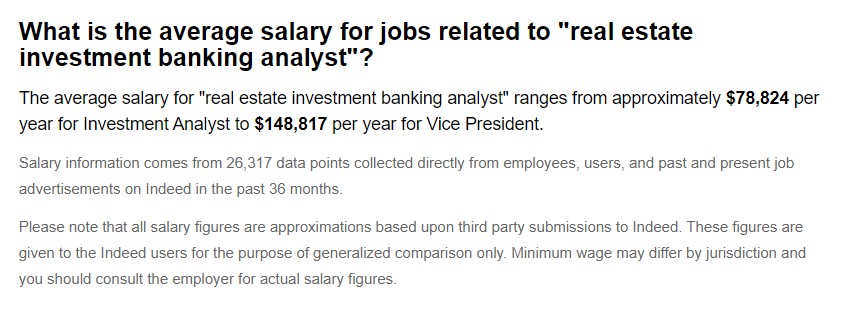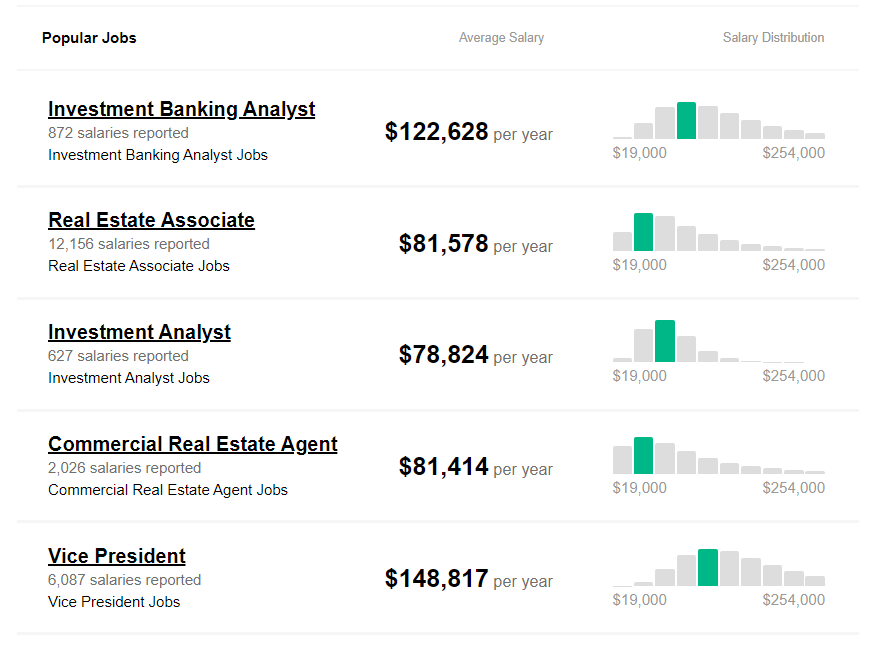What Is Real Estate Investment Banking?
Real estate investment banking is the financial engine that drives the world of property transactions by making money.
Real estate investment bankers are financial experts. They facilitate real estate deals by offering a wide range of services like:
- property matchmakers, connecting property buyers and sellers, and facilitating complex financing structures.
- crunching numbers, analyze market trends, and assess risks to help clients make informed investment decisions.
- raising capital through debt or equity offerings, to fund real estate projects.
In the competitive world of finance, real estate investment banking is challenging and it requires expert skills like juggling numbers, negotiating deals, and navigating the complexities of the property market.
If you want to make your mark in the finance game, then this is one path you cannot afford to overlook.
Real Estate Investment Banking Analyst
Being a RE investment banking analyst or associate is the commonest of offered positions.
As an associate/analyst, you get a unique opportunity to work in an entrepreneurial environment and apply analytical skills.
You are required to actively participate in cross-border negotiations and be a proactive and motivated team player, displaying discipline and total commitment.
The responsibilities of a RE investment banking analyst/associate include:
- perform real estate portfolio analysis and valuations such as Debt Yield analysis and DSCR
- prepare financial models applicable to various operational scenarios
- prepare market reports, presentations and research
- identify valuable real estate prospects for acquisition or reselling
- manage individual interactions actively
- be actively involved in dialogues between clients and other senior team members, and take note of advisory board, securitization needs, transaction counterparties and client management
- provide advisory services regarding commercial real estate
- review and order third party elements such as engineering, appraisal, title, legal deeds and others
- completely manage the due diligence process which includes information flow coordination, company analysis, virtual data room preparation, tracking information flow, monitor market information and review sponsors
To work as a RE investment banking analyst/associate, you need certain skills, experience (optional) and educational qualifications.
Educationally, you should have a Bachelors or Masters in Economics, Finance, Business, Law and other related subjects.
It’s good if you specialize in “real estate” but it’s tough to come across universities that offer a specific course.
In skills and experience, past experience of having worked in the investment banking or the real estate industry is obviously an added advantage. Firm knowledge of the real estate IB industry and working basics of financial valuation and modeling is recommended.
You should have credible judgment integrity and working ethics, plus discipline and commitment.
You should be able to work in a fast-paced environment and be self-motivated. Also, you are required to interact with clients in a professional manner.
You must have strong work ethics, be proactive, be organized, have the desire to learn, show intellectual curiosity, conduct independent research works, and excellent communication skills, both written and verbal.
Lastly but not the least, strong technical knowledge is mandatory such as using software like PowerPoint and Excel. Check out our review of Real Estate Financial Modeling course from BIWS.
Real Estate Investment Banking Salary
According to the Bureau of Labor Statistics, the IB industry will grow 10 per cent between 2018 and 2028 and obviously, the growth will reflect on the salary packages of the involved executives.


Since real estate is a segment of the IB industry, we couldn’t find any specific salary scale but reviewing various RE investment banking companies and popular trends, we found some comparable data to become your information source.
Real Estate Investment Banking Analyst Salary in India:

According to 2020 Indeed.com data, a real estate investment banking analyst earns INR 9,15,992 annually. The package depends on location, industry, company, experience and benefits.
Thus, we see that the salary offerings in the RE investment banking sector is varied and based on various reasons.
If you wish to see similar data of your country, search on the country-specific career tools as we did with Indeed.com, PayScale.com and Glassdoor.com.
20 Real Estate Investment Bank Firms
The RE investment banking firms listed below aren’t numbered based on any kind of ranking.
They are simply our handpicked list and neither is it a comprehensive list. Feel free to do your own search.
Our list includes:
- The Carlton Group [Current Openings]
- Hinduja Group
- Goldman Sachs [Current Openings]
- CBRE Capital Advisors [Current Openings]
- ABN AMRO [Current Openings]
- Raymond James [Current Openings]
- Citi Group [Current Openings]
- Morgan Stanley [Current Openings]
- JP Morgan [Current Openings]
- Cushman & Wakefield
- Key Bank [Current Openings]
- Moss Adams Capital [Current Openings]
- HSBC Private [Current Openings]
- Jones Lang LaSalle [Current Openings]
- Cowen Group
- Carval Investors [Current Openings]
- Scotia Bank
- Westwood Capital
- Bank of America [Current Openings]
- Aries Capital
Check out the linked section on current openings to apply or, you can search job networks like Indeed.com and CareerBuilder.com for more openings.
Real Estate Investment Banking Jobs
There is a lot of scope in the real estate IB industry. In this section, we will look into real estate IB jobs and career path.
The real estate IB industry is a ‘niche’ zone. Jobs are available but one has to be really on the lookout for the best of opportunities.
You can search for jobs on job search engines like Monster.com but before initiating a search; understand how you want to be placed in the industry.
The real estate IB has segments, as explained below.
Real Estate Investment Trusts (REITs)
REITs are equity firms involved in the improvement, operational, buying and selling of properties.
REIT’s can function globally or segment their business according to the nature of buildings (residential or commercial), property types and location.
Some of the REITs are listed publicly while others function as associations and corporations.
Working in REITs will involve activities related to capital raising and cash flow maintenance.
Most of the incomes are paid as dividends and there is always a need for constant cash flow.
IB in the Residential Sector (Internal Divisions)
Sometimes, companies involved in the residential sector such as home building companies remain limited within a specific geographic region, and such companies have internal financing divisions which often hire real estate analysts and associates to understand the market better and look into real estate financing.
Commercial & Large Individual Properties
RE investment banking isn’t limited to residential and core commercial properties, it also extends to lodging and gaming buildings like hotels and casinos that require high-scale investments.
Returns on these buildings are highly seasonal and are based on amenity investments.
Usually, companies hire real estate IB people to analyse the merit of investing in such buildings.
Real estate investment banks approach properties from a financing point of view rather than the perspective of a developer.
As a real estate investment associate or analyst, you are entrusted with the task to reveal the viability of investing in a property, on both long-term and short-term basis – that’s the moot agenda.
Here’s an interesting graph presented by PayScale.com which shows how your RE investment banking career can shape up or just investment banking, for that matter.

Majority of the people working in this field have 4 – 15 years of experience. National trends show that 53% of people in this industry have 1-4 years of experience while 30% have about 4-9 years of experience.

Statistically, the real estate IB industry sees more male workers than females.

Breaking into REIB can be accomplished in a variety of ways. You can opt for direct recruiting or convert internships into full-time jobs.
Look out for opportunities while you are still studying and try to imbibe the skills necessary for this career. Starting with an internship is the best option.
Networking will hold you in good stead. Use sites like LinkedIn and Quora to network with known personalities in the field.
You can build relationships with current employees of a company you are planning to apply to or you can talk to school alumnus for contacts and introductions.
Moving on, to better prepare for the real estate IB industry, follow the questions list below.
31 Real Estate Investment Banking Interview Questions
Some REIB interview questions you should prepare are listed below.
- Why do you want to join [company name]?
- Predict how the stock market will perform in the next one hour.
- What is the value of the shoe industry in India?
- What are your investment banking skills and how are they applicable?
- Talk about any IB deal you have handled in the past.
- Comment on any IB deal you’ve read about in the last few weeks or days.
- Discuss your quantitative skills.
- Run me through your resume in detail.
- How will you analyse real estate space requirements?
- What are the salient features of writing a real estate IB report?
- Why do you want to switch to real estate IB?
- Have you ever failed to honour a commitment?
- Why does your interest lie in capital markets?
- What is our company’s weakness? Explain.
- Who are our competitors and how can we beat them?
- What is your career goal?
- Discuss the feedback your previous employers gave?
- In 3 sentences, tell me why we should hire you?
- Have you ever faced ethical challenges during work? How did you handle them?
- Are you a leader or a follower?
- How does real estate IB function? Explain.
- Talk about our products and services.
- If we were to give you $20 million, how will you invest it?
- How can real estate IB and technology function together?
- Pitch me the stock of any company.
- How will real estate IB survive in a slower economy?
- How will depreciation reflect on property value?
- Explain some basic financial concepts.
- What is the value of real estate goodwill?
- What valuation methods are used in real estate IB?
- Explain some valuation methods.
Also, check out our BIWS review of investment banking interview guide.
Real Estate Investment Banking Exit Opportunities
Since REIB is a ‘limited’ field, professionals do worry about its exit opportunities.
What career opportunities are available if you decide to exit from real estate?
Usually, the most common transition from REIB is to Real Estate Private Equity but the transition is not always smooth.
Problems with skills might arise such as valuation issues but it mainly depends on the bank you are working with and your role.
You can also think of moving into long-only REIT Asset Management, real estate hedge funds, real estate operating company (REOC) and other real estate companies.
Lastly, you can also transition to generalist Private Equity (PE) but it will be tough to integrate yourself with the workings of a PE fund.
However, if you demonstrate a lot of interest and knowledge, skills, and industry-relevant experience, getting into PE will not be difficult. Check out our series on PE.
- How to become a private equity analyst?
- How to get a private equity job?
- Private equity interview questions
- Private equity vs. venture capital
Avoid moving into commercial real estate development because its more “brick and mortar” business and your IB skills won’t be a beneficial match.
Suggested: Read more about investment banking courses
Wrapping Up
Even though a niche segment, real estate investment banking offers good career opportunities.
If you are passionate about real estate and have interests in investments, real estate investment banking should be your choice.
Do share your feedback and comments below.


